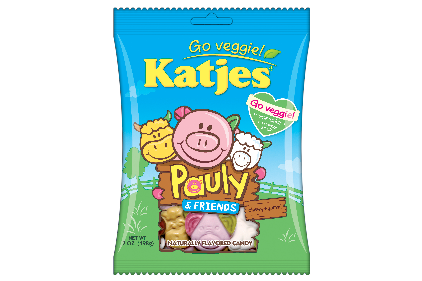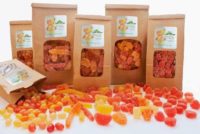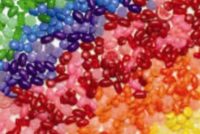While candy may not seem like the first thing many would imagine a vegetarian sacrificing, those in the confectionery industry know why those who stick to plants have developed this ritual — gelatin.
While it’s often the very thing that gives jelly beans to marshmallows their essence, it’s also made from animals.
So, as more and more people give up meat for various reasons, or various days, and as gelatin because more expensive than starch or pectin alternatives, confectionery companies and ingredient makers are working together to create candy that everyone can live with — literally.
Take Katjes’ Veggie line of gummies and jellies. The target market for the line is first and foremost flexitarians — people who abstain from different types of meat or abstain from meat on particular days of the week. And it’s that line of thinking that has widened the market for a product like veggie gummies.
As Tobias Bachmuller, managing partner of Katjes, points out, although vegetarians account for only 6-7 percent of the population in Germany, many women, particularly those in the 25 -34 range, only eat meat once or twice a week.
These de facto flexitarians are fueling Katjes’ success with its new Veggie line, which contains no animal gelatin. Currently, two-thirds of all the company’s products are “Veggie,” with the eventual target being 75 percent, says Bachmuller. And, the vegetarian-based gummies dovetails well with the company’s roots, which traces its beginning to that of an all-natural licorice company.
This April, the company also will be rolling out a new line of jellies under a Grunschwabel moniker or “Green Beak,” which will feature a parrot with a green beak touting such flavor varieties as pineapple, passion fruit and cactus fiber.
The move toward vegan candies hasn’t gone unnoticed by others in the industry. Hebert Mederer, president and ceo of the Mederer Group, acknowledged his company is also rolling out a line of gummies and jellies sans animal-based gelatin. Better-for-you confections is familiar territory for Mederer, as evidenced by the functional and veggie line gummies being produced in China by the company.
But for Mederer, gummies must also translate into fun. And the newly launched Trolli Blob, which features a flavored fruit gum “blob” augmented by two large open marshmallow eyes, certainly makes young and old smile. Plus, it’s reminiscent of the 1958 movie, The Blob.
Goody-Good Stuff, acquired by Cloetta in May 2013, also makes all their gummies without Gelatin.
At the time of the acquisition, Bengt Baron, Cloetta’s ceo, said Goody Good Stuff gave Cloetta product offerings within an “interesting segment.”
“The products from Goody Good Stuff can be consumed by everyone as it is a natural candy free from allergens,” he says.
Popular in both the U.S. and UK markets, Goody Good Stuff prides itself on products that are all natural, allergen-free and free of animal-based gelatin thanks to a unique process used to form the gummy snacks. As the requests for snacks that meet specific dietary needs increase, Goody Good Stuff will be there to answer the call. And so will Cloetta.
“This is a segment where we see increased consumer demand and where Cloetta can plan an important role,” Baron says.
The Organic Candy Factory, whose products are available at William-Sonoma, also sell gelatin-free gummies. And even Wrigley has removed the gelatin from their famous Skittles.
While gelatin may never be fully phased out of gummy and chewy candies, as more and more companies adopt gelatin-free recipes, be they pectin or starch replacements, as least vegetarians will stand a fighting chance when they flip over their next bag of gummy bears.







